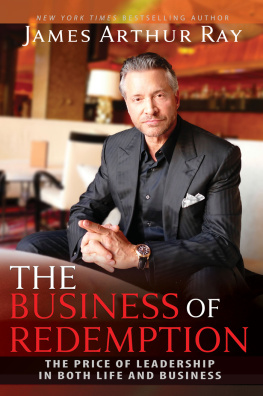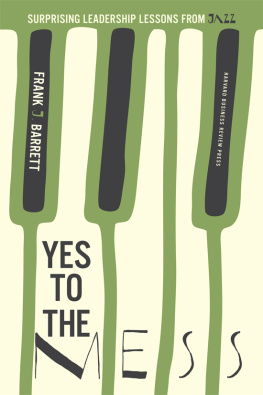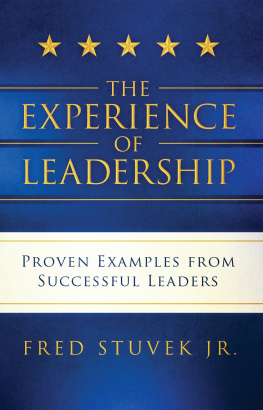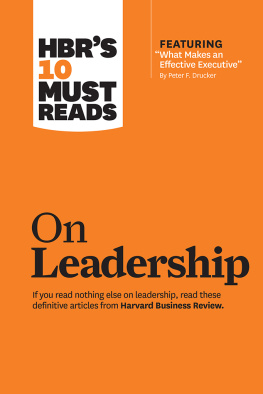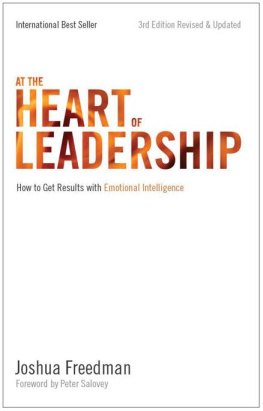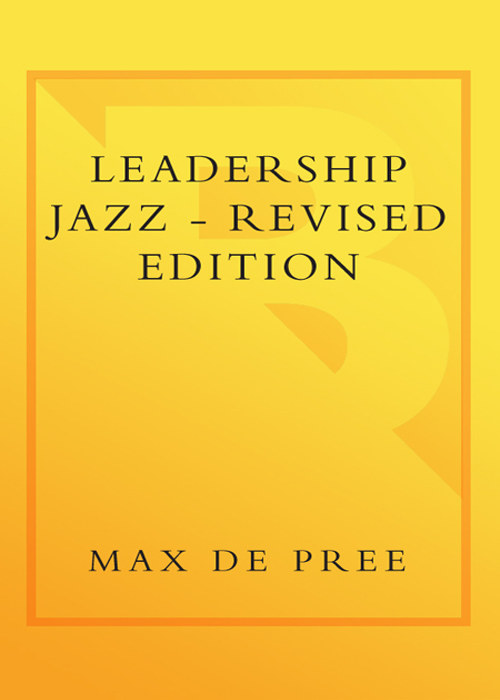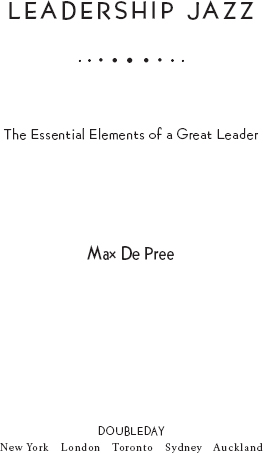Introduction to the 2008 Edition
YEARS AGO, MY FRIEND and mentor Peter Drucker compared the job of leading an organization to that of directing a symphony orchestra. His comparison, like many things Peter wrote, was widely quoted. Later, I suggested to him that another comparison might be to a jazz bandbecause performers in organizations are often called on to make their own variations on a tune, to improvise as part of a team, to innovate in concert with others. Peter told me he would consider my point of view.
This was the origin of the title of my second book on leadership, Leadership Jazz. Much to my surprise, its been in print since 1992. You just never know when a riff on a classic theme will strike a chord with your audience, do you? In the years between today and 1987, when my first book on leadership, Leadership Is an Art, appeared, the subject of leadership has become a well-plowed field of study. Hundreds of books have been written; students now study leadership in colleges and universities.
I have always believed that questions live onanswers are transient. My question now is, why has the topic of leadership struck such a chord? Why has the job of leader become such a focus? And how has the role of leader changed since I wrote Leadership Jazz?
The job of leader has always been a complicated and difficult thing to take on. Groups around the world value real leaders, and it seems to many people that real leaders are now scarcer than ever. Technology has given events a global immediacy, and leaders are scrutinized constantly and closely. There are, as there have always been, many different kinds of leadership. A central dilemma remains: how to sort out the beliefs that must precede and lead to action on the part of leaders. This challenge, I admit, has not gotten any easier.
It seems to me that these days, when followers bring an infinite array of creative gifts and talents to organizations, being a leader requires even more careful thought and more focused action. Leadership Jazz seems an even more appropriate title and way to examine the idea and practice of leadership. Today leaders in organizations of all sorts are depending more and more on their band members for the performance.
As we enter this new century, a leaders band is likely to be spread around the world. A new type of performance will be made possible by technology that was unheard of when Leadership Jazz was first published. Cell phones and the Internet make communicationat least the technical aspects of communicationa constant and easy option. The notions of a flat world (Thomas Friedmans phrase) and global economy have become clichs.
Yet the name of the game for so many organizations is still assembling talent, just as it was for the great jazz band leaders. Without talented followers, a leader can do nothing but play solo.
The evidence is pretty convincing that attracting and keeping talented performers/employeesall of whom, we must remember, are really volunteersshould be the chief concern of leaders in the profit and nonprofit worlds. A poll by ManPower in 2005 found that almost half of its clients could not fill the vacant permanent positions they had open. The 2006 Spherion Emergent Workforce Study showed that 40 percent of workers were interested in seeking a new job in the next year. The pool of young people is growing more slowly than ever. Many people believe a labor shortage is coming soon.
It seems to me that oftennot always, of coursea leaders role is more like that of a Socratic teacher than of one who gives orders. This is especially true when you think, as I do, of a leaders job as developing people rather than directing them, of drawing ideas and skills out of them rather than telling them how to use what they already have. I believe younger people are looking for this kind of leadership more than ever, the kind of jazz leadership that sets a tempo and picks a tune and then steps back while the rest of the band makes music.
Four Questions
These thoughts naturally make me consider the kinds of questions likely to help folks set out on their own with confidence. They lead me, as you might expect, to ask myself more questions. Perhaps you would also like to ponder these questions. Here are my four. (I should add that you are probably much younger than I am; my questions result from things I am still learning about leadership at the age of eighty-three. Im happy to tell you that becoming a better leader is a job that never ends!)
How can I know whats in the hearts of my followers?
Tom (N.T.) Wright, Bishop of Durham and noted author, in his book Simply Christian, has a wonderful way of describing what echoes in many hearts. He lists four things:
Hunger for relationships
Delight in beauty
Quest for spirituality
Longing for justice
Could these four echoes guide us in our behavior as leaders? Perhaps.
What gifts of leadership have I come to treasure most?
The first is integrity. This should come as no surprise. As a very young manager, I asked my father how he would define quality. Without a moments hesitation, he said, Quality is truth.
Intimacy is second. We must be intimate in our relationship with our work. Peter Drucker, in yet another of his wise observations, said that The best manure is the eye of the farmer.
The ability to imagine consequences is third. Two young mothers I know had a conversation about children. One said she would like to have several babies. The other said, Would a better question be, how many teenagers do you want to have?
We are a society that claims to be truly dedicated to becoming more and more inclusive. Ive come to believe that inclusiveness requires leaders to give the gift of self-restraint to followers. Sadly, every day the media give us examples of leaders who practice anything but self-restraint.
What questions do I now wish I had been asked?
If I really listed all the questions I wish I had been asked, I would have to write another book. Instead, here are three good ones.
Who do you intend to be? As a young manager, I was preoccupied with doing things. I now understand that what I do is a consequence of what I believe and who I am.
Do you understandreally understandhow crucial relationships are? Carl Frost, another of my wonderful mentors, a professor at Michigan State University and consultant to Herman Miller, called me to task one day for having treated a small work team quite unfairly. He advised me that if I was going to treat people in such a fashion, I should practice my leadership at home, where people love me enough to forgive my mistakes. Here at work, he said, they dont love you that much. Remember: Good relationships are rooted in gratitude.
Are change and innovation the consequences of inspiration or revelation? What does the distinction between insight and discovery mean for leaders?
Finally, what questions would I ask you?
Who do you intend to be?
Do you believe that belief precedes behavior?
Who gives you health?
What do you, as a leader, owe?
What may you keep? (This is really a question about your world view.)
Global Citizenship


